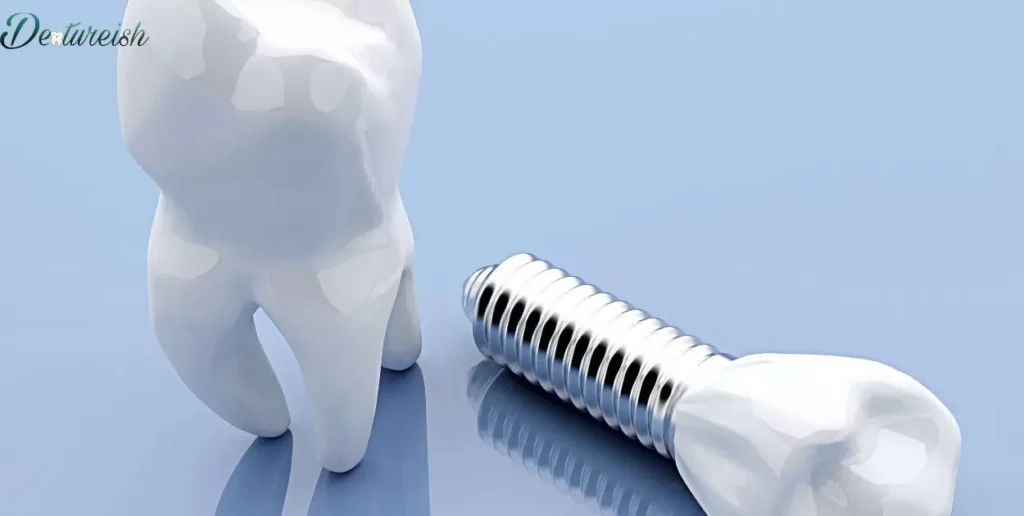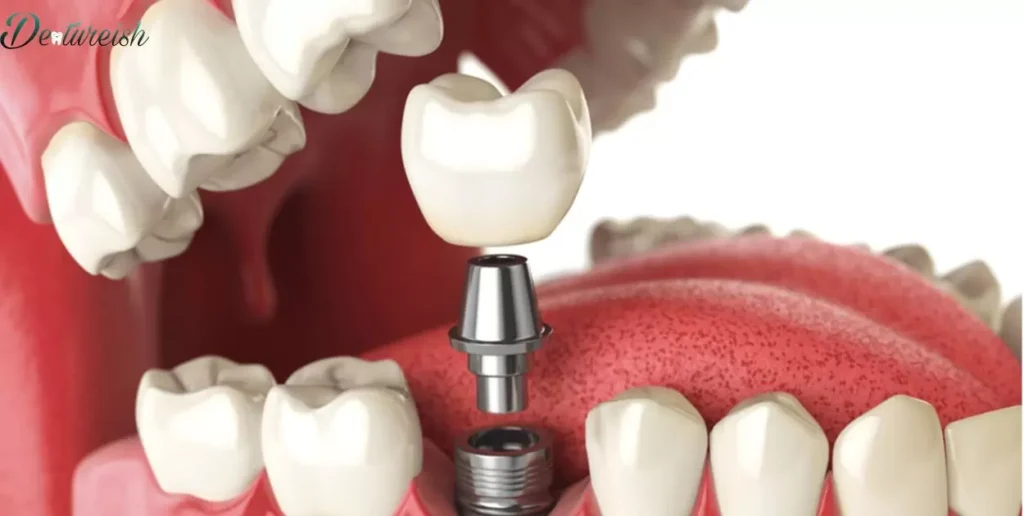Dental implants after dentures refer to the placement of artificial tooth roots into the jawbone to support replacement teeth, offering a stable and permanent solution after the use of dentures. This procedure enhances oral function, restores a natural appearance, and improves overall dental health for individuals seeking a more durable and long-term tooth replacement option.
Curious about upgrading your smile? Wondering, ‘Can you get dental implants after dentures?’ Discover the transformative solution you’ve been searching for! Uncover the benefits of dental implants – a permanent, secure, and natural-looking alternative. Take the first step toward a confident and comfortable smile by exploring the possibilities today.
You can get dental implants after dentures. This innovative procedure involves placing artificial tooth roots in the jawbone to secure permanent replacement teeth, offering a more stable and natural solution for individuals seeking long-term dental improvement.
Can You Get Dental Implants If You Have No Teeth
If you have no teeth, you can still get dental implants. Dentists use implants to replace missing teeth, providing a durable and natural-looking solution. During the procedure, they anchor the implants directly into the jawbone, offering stability and functionality similar to natural teeth.
This option is available for individuals with complete tooth loss, enhancing their ability to eat, speak, and smile comfortably. Consulting with a dentist is essential to determine if you are a suitable candidate for dental implants.
They will assess your oral health and discuss the best treatment plan tailored to your specific needs. Remember, dental implants offer a reliable solution for those missing teeth, restoring both functionality and confidence in your smile.
Overview of Dentures and Their Limitations
Dentures are removable dental appliances designed to replace missing teeth. They come in two types: full dentures, which replace all teeth, and partial dentures, which replace only a few missing teeth. While dentures offer a practical solution for restoring a natural smile, they have limitations.
One drawback of dentures is their potential to cause discomfort and difficulty in speaking or eating. Additionally, they may need adjustments over time due to changes in the jaw and gum structure. Despite these limitations, dentures remain a popular choice for tooth replacement, providing an affordable and non-invasive option for those seeking to regain their oral function and appearance.
The Evolution of Dental Solutions
Dental solutions have evolved significantly over time. Initially, basic treatments focused on relieving pain, but modern dentistry now emphasizes preventive care. Today, advanced technologies like digital imaging and laser dentistry play crucial roles in diagnosing and treating oral health issues.
In recent decades, there has been a shift towards minimally invasive procedures and cosmetic dentistry, providing patients with more comfortable and aesthetically pleasing options. The evolution of dental solutions reflects a commitment to improving patient experiences and outcomes, showcasing the continual progress in oral healthcare.
Benefits of Dental Implants Over Dentures
- Permanent Solution: Dental implants offer a long-lasting and permanent tooth replacement option. Unlike dentures that may need frequent adjustments, implants fuse with the jawbone, providing a stable and durable foundation for artificial teeth.
- Natural Feel and Function: Implants closely mimic natural teeth in both appearance and functionality. They allow for comfortable chewing and speaking, providing a more natural feel compared to removable dentures, which can sometimes be less secure and may cause discomfort.
- Preservation of Jawbone: Dental implants help preserve jawbone health by stimulating bone growth. This prevents the bone loss that can occur with dentures, maintaining facial structure and preventing the sunken appearance that may result from prolonged denture use.
- Improved Oral Health: Unlike dentures, dental implants do not require alterations to neighboring teeth. This preservation of adjacent teeth contributes to overall oral health, ensuring that healthy teeth remain unaffected during the tooth replacement process.
- Enhanced Confidence and Aesthetics: Dental implants provide a more aesthetically pleasing solution, closely resembling natural teeth. This restoration of a confident smile can positively impact an individual’s self-esteem and social interactions, distinguishing implants from traditional dentures.
Consultation with a Dental Professional
When you need dental advice, talk to a dental professional. Schedule an appointment with your dentist to discuss any concerns or questions about your oral health. A dental consultation ensures personalized guidance and helps you maintain a healthy and vibrant smile.
During the consultation, the dental professional examines your teeth and gums. They provide expert advice on oral hygiene, address specific issues, and offer preventive measures. This proactive approach to dental care promotes overall well-being and helps you achieve optimal oral health.
Understanding Dental Implant Procedures
Dental implant procedures involve replacing missing teeth with artificial tooth roots. Dentists surgically place these implants into the jawbone, providing a sturdy foundation for replacement teeth. Patients benefit from improved stability and functionality, restoring their ability to chew and speak comfortably.

During the procedure, the dentist first assesses the patient’s oral health and takes X-rays to plan the implant placement. The surgery itself typically requires local anesthesia, and the dentist attaches a custom-made crown or bridge to the implant once it integrates with the jawbone.
When Is It Too Late To Get Dental Implants
If you’re considering dental implants, timing matters. The best window for getting dental implants is often within a few months of tooth loss. Waiting too long may lead to bone loss, making the procedure more complex.
Once teeth are extracted, the jawbone can gradually diminish. If too much time passes, there might not be enough bone for successful implant placement. Early consultation with a dentist ensures timely decisions and increases the likelihood of a successful dental implant procedure.
Comparing Costs: Dentures vs. Implants
Here’s a simple table comparing costs between dentures and dental implants:
| Aspect | Dentures | Dental Implants |
| Initial Cost | Generally lower upfront | Higher initial investment |
| Long-Term Cost | May require periodic | Potentially lower over |
| replacements and repairs | the long term due to | |
| leading to cumulative | durability and longevity | |
| costs | ||
| Maintenance | Regular cleaning and | Similar oral hygiene |
| occasional adjustments | practices as natural teeth | |
| Comfort & Fit | May be less comfortable | Mimics natural teeth, |
| and may require adhesives | providing better comfort | |
| for stability | and fit | |
| Aesthetics | Appearance may not be as | Natural-looking and |
| natural as implants | aesthetically pleasing | |
| Bone Health | Does not stimulate bone | Stimulates bone growth, |
| growth, may lead to | preserving jawbone density | |
| bone resorption | ||
| Durability | Prone to wear and tear, | Durable and can last a |
| may need replacement | lifetime with proper care | |
| over time | ||
| Eating & Speech | Adaptation required for | Functions like natural |
| eating and speech | teeth, minimal adaptation | |
| needed |
The costs and considerations can vary based on individual cases, dental health, geographic location, and the materials used. It’s essential to consult with a dentist for personalized advice and cost estimates.
Combining Dentures and Implants: Hybrid Solutions
When considering dental options, hybrid solutions, which combine dentures and implants, offer a compelling choice. These solutions blend the affordability of dentures with the stability of implants. With hybrids, individuals can enjoy the natural feel and durability of implants while benefiting from the cost-effectiveness and flexibility of traditional dentures.
Hybrid solutions provide a practical middle ground, ensuring a comfortable fit, improved aesthetics, and enhanced chewing ability. Dentists customize these solutions for each patient, creating a seamless blend of dentures and implants that cater to both functional and financial considerations.
Aftercare and Maintenance of Dental Implants
Taking care of dental implants is crucial for a healthy smile. Regularly brush your teeth and implants using a soft-bristle brush and non-abrasive toothpaste. Floss daily to remove debris between teeth and around the implant.
Avoid tobacco and limit alcohol intake to promote implant longevity. Schedule routine dental check-ups for professional cleaning and monitoring. Remember, your commitment to oral hygiene plays a key role in maintaining the health and durability of your dental implants.
Technological Advances in Dental Implantology
Dental implantology has seen impressive technological strides. Modern advancements have enhanced the precision of implant placement, making the procedure more efficient. Imaging technologies, like 3D scans, aid in detailed planning, ensuring better outcomes for patients.

Improved materials and techniques contribute to quicker healing times and increased durability. These technological breakthroughs not only streamline the dental implant process but also enhance the overall patient experience, making dental implants a more accessible and reliable option for restoring smiles.
Insurance Coverage for Dental Implants vs. Dentures
Here’s a simple table comparing insurance coverage for dental implants and dentures:
| Aspect | Dental Implants | Dentures |
| Coverage Availability | Limited or not included | Often covered, at least |
| in basic dental plans | partially | |
| Cost Coverage | Typically lower coverage | More likely to be covered |
| or considered elective | to some extent, especially | |
| for basic denture types | ||
| Procedure Costs | May cover only certain | More likely to cover |
| aspects, such as surgery | major expenses, including | |
| extractions and fittings | ||
| Limitations | Often subject to annual | Coverage may have |
| maximums or waiting | limitations or waiting | |
| periods | periods | |
| Pre-authorization | Often required before | May require pre-approval |
| undergoing the procedure | for specific procedures | |
| Replacement Costs | Limited coverage for | May cover replacement |
| implant failures or | or adjustments over time | |
| complications | ||
Insurance coverage varies widely among plans and providers. It’s essential to check the details of individual insurance policies and consult with the insurance provider for accurate and up-to-date information.
How Much Is A Full Set Of Dental Implants
Getting a full set of dental implants can vary in cost. On average, it ranges from $3,000 to $30,000, depending on factors like location, materials used, and additional procedures. Dental implants offer a durable and natural-looking solution, but it’s crucial to consult with your dentist to get an accurate estimate based on your specific needs.
The overall expense of a full set of dental implants, including implant placement, abutments, and the final restoration, might initially seem like a significant investment. However, it’s important to consider the long-term benefits that come with this comprehensive approach to tooth replacement. For those who are seeking a solution for a single missing tooth, the option of dentures for one tooth might be explored. Despite the initial cost, the advantages of improved oral function and a natural appearance often make the investment worthwhile.
Exploring the Psychological Impact of Dental Changes
Discovering how changes in your teeth and smile affect your mind is essential. A transformed smile can boost confidence and positively influence mental well-being. Understanding the psychological impact of dental changes sheds light on the crucial link between oral health and emotional health.
When your teeth undergo alterations, it’s not just a physical transformation. The way you perceive yourself and interact with others can change significantly. Exploring this connection helps recognize the importance of addressing both the physical and psychological aspects of dental care for overall well-being.
Dental Implants For Denture Wearers
Denture wearers exploring dental implants can expect improved stability and comfort. Unlike dentures, dental implants mimic natural teeth, offering a secure fit and better support for chewing and speaking. The process involves surgically placing titanium posts into the jawbone, promoting bone stimulation and preserving overall oral health.
Dental implants provide a long-term solution, eliminating the need for frequent adjustments or replacements associated with traditional dentures. Patients often find that dental implants enhance their confidence and overall quality of life by restoring a more natural look and feel to their smiles.
Customization Options for Dental Implants
When choosing dental implants, you have various customization options. Your dentist can match the color, shape, and size of the implant to your natural teeth, ensuring a seamless blend. These personalized choices contribute to a more natural look and feel, enhancing your overall satisfaction with the implant.
Customization extends to the type of implant and the materials used. You and your dentist can decide on the best fit for your specific needs, considering factors like durability and cost. This hands-on approach empowers you to make informed decisions about your dental health, resulting in a personalized and effective solution.
Addressing Denture Discomfort: Is Implantation the Solution?
Are you tired of denture discomfort? Consider dental implantation for relief. Implants provide stability, making eating and speaking more comfortable. Say goodbye to denture issues and hello to a more confident smile with this effective solution.

Implantation is a popular choice for many seeking lasting relief. It involves securely anchoring artificial teeth to your jawbone. This not only eliminates discomfort but also restores natural function. Experience the freedom of a secure and stable dental solution with implantation.
Navigating the Decision-Making Process with Your Dentist
When deciding on dental treatments, talk directly with your dentist. Ask questions about your options and understand the pros and cons. This active communication helps in making informed decisions about your oral health.
Your dentist can guide you through the decision-making process. Discuss concerns, express preferences, and work together to create a personalized treatment plan. This collaborative approach ensures that you are actively involved in decisions about your dental care.
Potential Challenges in Shifting from Dentures to Implants
Shifting from dentures to implants poses some challenges. First, adjusting to the new sensation of dental implants can take time. Patients may experience discomfort or altered speech initially.
The cost of dental implants is a significant factor. Unlike dentures, implants often require a higher upfront investment. Financial considerations can be a hurdle for individuals exploring this transition. Overall, while dental implants offer long-term benefits, overcoming initial discomfort and addressing cost concerns are key challenges in making the shift from dentures.
How Much Do Snap-In Denture Implants Cost
Snap-in denture implants cost varies based on factors like location, dentist expertise, and materials used. On average, the expenses range from $3,000 to $30,000. Prices may include consultation, implant placement, and the denture itself.
The type of material chosen for the denture significantly influences the overall cost. Acrylic dentures are generally more affordable than those made of porcelain. Additionally, geographic location plays a role, with urban areas often having higher prices.
Collaborative Decision-Making with Dental Specialists
In collaborative decision-making with dental specialists, teamwork is crucial. Dentists and specialists work together to analyze patient cases, sharing insights and expertise. This approach ensures comprehensive treatment plans, promoting better oral health outcomes.
Communication plays a key role in this collaborative process. Open dialogue among dental professionals fosters a collective understanding of patient needs. By actively engaging in decision-making, specialists and dentists create a synergy that enhances the overall quality of dental care, leading to improved patient satisfaction and well-rounded treatment solutions.
Innovations in Denture and Implant Technology
Denture and implant technology have seen remarkable advancements. Modern innovations focus on improving comfort and functionality for users. Dentures now use high-quality materials, providing a more natural look and feel.
Implant technology has evolved to enhance stability and durability. Innovations include advanced materials like titanium and improved techniques for precise placement. These developments contribute to better oral health and increased satisfaction for individuals relying on dentures and implants.
Getting Implants After Dentures
If you’ve had dentures and are looking for a more permanent solution, getting dental implants could be the answer. Dental implants offer a secure and natural-feeling option for replacing missing teeth. They provide stability, allowing you to eat, speak, and smile with confidence.
Choosing to get implants after dentures involves a straightforward procedure. The dentist will anchor the implants securely in your jawbone, ensuring a comfortable and lasting fit. With implants, you can enjoy the benefits of a more permanent and stable solution, enhancing both the functionality and aesthetics of your smile.
Tips for a Smooth Transition to Dental Implants
- Enhanced Oral Health: Following tips for a smooth transition to dental implants ensures better oral health. Good oral hygiene practices contribute to the success of the implant procedure, reducing the risk of complications.
- Effective Communication: Open communication with your dentist is a key benefit. Discussing concerns and asking questions helps address any uncertainties, ensuring a clear understanding of the process and expectations.
- Faster Recovery: By adhering to suggested dietary guidelines, such as maintaining a soft diet during the initial healing phase, you promote a quicker recovery. This accelerates the adaptation of the implants and reduces discomfort.
- Long-Term Success: Consistent aftercare, including regular check-ups and oral care routines, contributes to the long-term success of dental implants. This investment in ongoing maintenance helps preserve the health and functionality of the implants.
- Positive Lifestyle Change: Choosing dental implants is a positive step towards an improved lifestyle. Enjoy the benefits of a fully restored smile, increased confidence, and the ability to comfortably eat a variety of foods without concerns about denture stability.
Exploring Hybrid Denture-Implant Solutions in Detail
Hybrid denture-implant solutions offer a dynamic approach to tooth replacement. Dentists use these solutions to combine the stability of dental implants with the convenience of removable dentures.
In this comprehensive exploration, we delve into the benefits and considerations of hybrid denture-implant solutions. These innovative options provide patients with a reliable and comfortable alternative, enhancing both functionality and aesthetics in dental care.
Can Dental Implants Be Removed And Replaced With Dentures
Dental implants can be removed and replaced with dentures. Dentists may recommend this procedure if the implants are causing issues or if the patient prefers dentures for personal reasons.
The process involves extracting the implants and fitting custom dentures. It’s a straightforward procedure that can improve comfort and functionality for those who opt for dentures over implants.
Frequently Asked Question
Can you get implants after wearing dentures for 30 years?
Yes, you can get implants after wearing dentures for 30 years. Dental technology allows for implant placement even after a long period of denture use, offering a potential solution for improved stability and comfort.
Are dental implants good over dentures?
Yes, dental implants are generally considered better than dentures because they provide a more stable and natural-feeling solution for missing teeth. Implants offer improved chewing function and prevent bone loss in the jaw.
How painful is implants for dentures?
Implants for dentures can be mildly uncomfortable during the initial healing period, but overall, patients usually experience manageable pain that can be alleviated with prescribed medications.
Are implants more expensive than dentures?
Yes, implants are generally more expensive than dentures. Implants involve surgical procedures and custom components, contributing to their higher cost compared to traditional dentures.
Conclusion
Exploring the possibility of getting dental implants after dentures is a viable option for many individuals seeking a more permanent and comfortable solution for tooth replacement. The advancements in dental technology have made it increasingly feasible to transition from dentures to dental implants, providing patients with improved functionality and a natural-looking smile.
The decision to pursue dental implants after dentures depends on individual circumstances and preferences. Consulting with a qualified dental professional is crucial to assess eligibility and determine the most suitable course of action for achieving optimal oral health and overall well-being.

